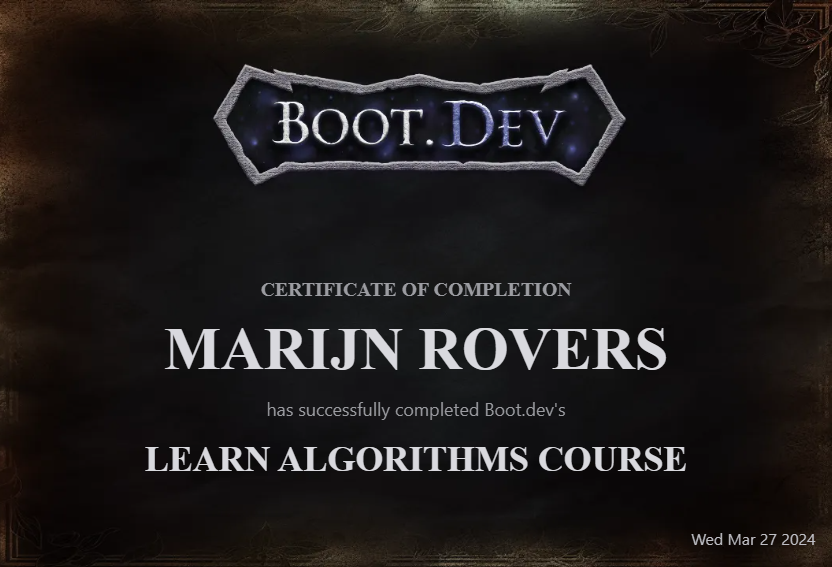Algorithms Certificate at Boot.Dev
Introduction to Algorithms Finished! - My Algorithms Certificate at boot.dev
Algorithms, a fundamental concept in computer science, can be quite challenging to grasp. However, after putting in dedicated effort and perseverance, I am thrilled to announce that I have successfully completed my algorithms certificate at boot.dev. While it may not have been my favorite topic, I am proud to have gained a strong understanding of the subject and its significance in the world of business.
Algorithms serve as the backbone of numerous technological advancements and play a crucial role in problem-solving and decision-making processes. They enable businesses to optimize operations, streamline workflows, and uncover valuable insights from vast amounts of data.
Why Algorithms Matter in Business
As a professional in the business world, it is essential to recognize the importance of algorithms. They empower organizations to make data-driven decisions, improve efficiency, and enhance overall competitiveness.
Algorithms enable businesses to:
- Optimize Processes: By utilizing efficient algorithms, businesses can streamline their operations and reduce costs. From supply chain management to resource allocation, algorithms provide valuable solutions that enhance productivity and minimize wastage.
- Personalize Customer Experiences: Algorithms play a crucial role in creating personalized experiences for customers. By analyzing data and patterns, businesses can tailor their products, services, and marketing campaigns to individual preferences, increasing customer satisfaction and loyalty.
- Forecast Trends: With the help of algorithms, businesses can analyze historical data to predict future trends. This allows them to make informed decisions, anticipate market changes, and stay ahead of the competition.
- Identify Patterns and Anomalies: Algorithms can analyze vast amounts of data to identify patterns and anomalies that may go unnoticed by human analysts. This aids in fraud detection, risk assessment, and anomaly detection, helping businesses protect their assets and make informed decisions.
Next Chapter: Exploring Dataframes
While I may have completed my algorithms certificate, my learning journey continues. The next chapter on dataframes awaits, and I am excited to dive deeper into this topic.
Dataframes are a powerful tool for organizing, analyzing, and manipulating data. They provide a structured way to store and process large datasets, making it easier to extract valuable insights. With data becoming increasingly abundant and essential in the business landscape, understanding dataframes is an invaluable skill for any professional.
Through my studies at boot.dev, I aim to gain a comprehensive understanding of dataframes and their applications in various business domains. From data preprocessing and cleansing to data visualization and analysis, dataframes offer a versatile framework for extracting meaningful information from complex datasets.
By mastering dataframes, I will be equipped with the skills needed to uncover hidden patterns, derive actionable insights, and make data-driven decisions to drive business growth and success.
Conclusion
Completing my algorithms certificate at boot.dev has been an enriching experience. Despite algorithms not being my favorite topic, I have gained a strong understanding of their importance in the business world. Algorithms empower businesses to optimize processes, personalize experiences, forecast trends, and identify patterns and anomalies.
As I embark on the next chapter of my learning journey with dataframes, I am excited about the possibilities they hold. Dataframes provide a powerful framework for organizing and analyzing data, enabling professionals to extract valuable insights and make data-driven decisions.
Stay tuned as I share my learnings and experiences with dataframes, exploring their applications and impact on business success.

Comments powered by Disqus.